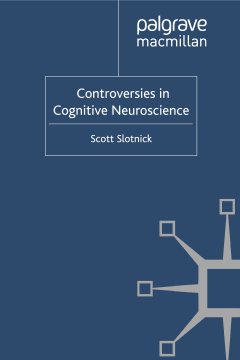
Additional Information
Book Details
Abstract
When we're thinking about how the brain works, why do we believe that one explanation is better than another? Is the majority view necessarily the correct view? In Controversies in Cognitive Neuroscience, Scott Slotnick tackles the most contentious debates within the exciting and fast-paced field of cognitive neuroscience. Student-focused and sympathetically written, its deep engagement with cutting-edge debates will help you develop your critical thinking skills.
Providing evidence from both sides of each debate, the book covers essential topics such as long-term memory, working memory, language, perception, and attention. By helping you to weigh up the evidence and choose the most compelling answer, Controversies in Cognitive Neuroscience will enhance your analytical skills. With its unique debate format and a wealth of illustrations, the book brings to life the key issues that are sparking debate within psychology and neuroscience.
"One of the most crucial skills for university students is to learn how to become critical consumers of scientific knowledge. This book provides the ideal structure and support to develop their own critical evaluation of cognitive neuroscience." - Professor Deborah Hall, Director, NIHR National Biomedical Research Unit in Hearing, Nottingham, UK
"Capitalizing on the insight that much can be learned from scientific disagreements, Controversies in Cognitive Neuroscience clearly presents ideas and findings from the cutting edge of the field. Slotnick's provocative style might ruffle a few feathers, but his lively account will engage and inform both students and researchers in numerous areas of contemporary cognitive neuroscience." - Daniel L. Schacter, William R. Kenan, Jr. Professor of Psychology, Harvard University, USA, and author of The Seven Sins of Memory: How the Mind Forgets and Remembers
"This book presents a series of debates on some of the current hot topics in Cognitive Neuroscience. It is an excellent way to spark the enthusiasm and curiousity of students. By encouraging students to think critically about the links between evidence and theory, Slotnick has done a great service to the field." - Dr Jamie Ward, Associate Professor, University of Sussex, UK
Scott Slotnick is Associate Professor of Psychology at Boston College, USA. As well as teaching undergraduate and graduate courses in cognitive psychology and cognitive neuroscience, he is also an active researcher in this field with particular interest in the neural mechanisms mediating human memory, perception, and attention.
Table of Contents
| Section Title | Page | Action | Price |
|---|---|---|---|
| Cover | Cove | ||
| Contents | vii | ||
| List of Figures | viii | ||
| List of Tables | xii | ||
| Preface | xiii | ||
| 1 Cognitive Neuroscience: The Bare Bones | 1 | ||
| 2 The Fusiform Face Area | 18 | ||
| 3 The Nature of Attentional Modulation in V1 | 44 | ||
| 4 Long-Term Memory and the Medial Temporal Lobe | 70 | ||
| 5 Working Memory Segregation in the Frontal Cortex | 97 | ||
| 6 The Visual Word Form Area | 122 | ||
| 7 Can Visual Mental Images be Pictorial? | 144 | ||
| 8 The Neural Basis of Processing Animacy | 165 | ||
| 9 The Adequacy of fMRI | 186 | ||
| 10 Cognitive Neuroscience at a Crossroads | 213 | ||
| Index | 218 |
